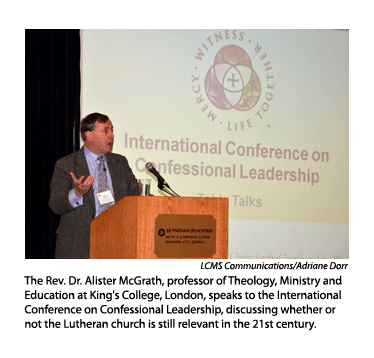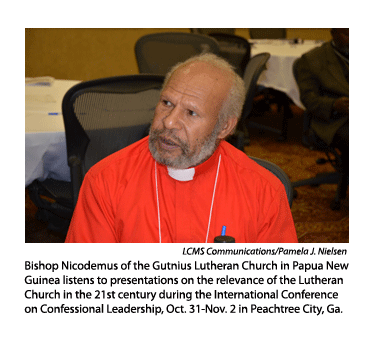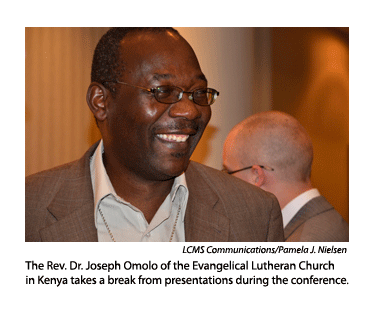By Adriane Dorr
PEACHTREE CITY, Ga. — On Oct. 31 — the 495th anniversary of the Reformation — the Rev. Dr. Alister McGrath, a professor at King’s College, London, called on confessional Lutherans around the world to con tinue to “unpack, interpret and translate” the words of the Rev. Dr. Martin Luther in the contemporary culture.
tinue to “unpack, interpret and translate” the words of the Rev. Dr. Martin Luther in the contemporary culture.
Speaking to 120 Lutheran church leaders representing 20 million Lutherans from Africa, Asia, Europe, Latin America, Australia and North America, McGrath urged all Lutherans to “go back to this resource [Luther] to enrich the present-day mission.”
McGrath, a leading critic of the New Atheism and an advocate of the importance of theology in apologetics, mission, evangelism, spirituality and social engagement, is also a former atheist whose interest and eventual conversion to Christianity was due in part to his reading of Luther.
Serving as keynote speaker to the International Conference on Confessional Leadership, sponsored here Oct. 31-Nov. 2 by The Lutheran Church–Missouri Synod, McGrath set the stage for a series of follow-up responses from pastors from Taiwan, Nigeria, Brazil and England regarding the relevance and importance of Luther and the Lutheran church in the 21st century.
A failure to share Luther’s insights and the enduring confessional Lutheran perspective with the 21st century, noted McGrath, will result in a “treasure chest” of doctrine that will “remain unopened because the language isn’t underst ood.”
ood.”
“It’s much easier to withdraw and not engage with anyone else,” McGrath admitted, “but Luther is a witness to the more uncomfortable truth that we need to be there at the intersection of Christ and culture, bearing witness to the Gospel.”
Bishop Christian Ekong of the Lutheran Church of Nigeria offered a response, explaining that Luther’s reformational “understanding of grace alone was completely the work of the Holy Spirit,” a belief that allowed laypeople to understand that “God is accessible to every person, to every Christian.”
The Rev. Dr. Joel Humann of the Evangelical Lutheran Church of England noted that this kind of bold Lutheran witness is particularly apropos to the 21st century. It is, he said, “radically ecumenical” due to the “one, holy, Christian and apostolic” nature of the Church, which “depends solely on Christ.”
“The essence of the Church is dependent on Christ,” Humann reminded attendees. “Where Christ is, there is His Church. He is present in His Word of the Gospel. … He is present in the Sacrament, even w hen we might fail to comprehend or appreciate it fully.”
hen we might fail to comprehend or appreciate it fully.”
The first day of the conference ended with a panel discussion including McGrath and each of the responders.
Continuing the conference theme of “The Lutheran Church in the 21st Century: How does it look? Why does it matter?,” attendees will hear from Bishop Emeritus Jobst Schoene of the Independent Evangelical Lutheran Church of Germany on Thursday, Nov. 1. Schoene will speak to the importance of “Life Together” in global Lutheranism in the 21st century. Responses will be presented by various Lutheran leaders from across the globe.
Daily news briefs and updates from the conference are available at the Witness, Mercy, Life Together blog (http://wmltblog.org/), Twitter (www.twitter.com/thelcms), the LCMS Facebook page (www.facebook.com/thelcms) and KFUO Radio (www.kfuo.org). The conference is made possible by generous grants from Thrivent Financial for Lutherans and The Lutheran Church Extension Fund.
Adriane Dorr is managing editor of The Lutheran Witness.
Posted Oct. 31, 2012 / Updated Nov. 1, 2012



